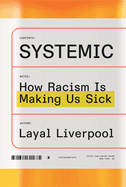
Science journalist Layal Liverpool's Systemic is a fascinating and troubling look at how racism and racial biases impact health outcomes. Liverpool uses both personal stories and statistics to demonstrate these effects, making a clear case that racism is indeed a public health issue.
Beginning with a chapter about pregnancy and childbirth, which in the U.S. and the U.K. (the countries most often cited throughout the book) is significantly more dangerous for Black and other non-white women and birthing people, Liverpool takes readers through the numerous and varied ways in which racism affects everyone. Among these are medical textbooks, which generally depict skin conditions only on lighter skin--aside from STIs, which are more commonly depicted on darker skin--and genetic studies, which predict diseases less accurately in populations of Asian and African descent than in populations of European descent.
Liverpool dispels pernicious myths about Black people, such as their supposedly higher pain tolerance or thicker skin, which contribute to worse health outcomes. She also highlights how many health-care professionals seem less likely to listen to or believe Black, Indigenous, and other people of color when they talk about their health and their bodies.
The book includes illustrative anecdotes, such as that of Ella Adoo-Kissi-Debrah, whose death from a rare form of asthma was determined to have been caused by air pollution. Stories like this give a human dimension to the statistics Liverpool cites and amplify the seriousness of the problem.
Until health outcomes are equal among all people, Systemic will continue to be a vital resource for anyone concerned with the well-being of their community. --Alyssa Parssinen, freelance reviewer and former bookseller

